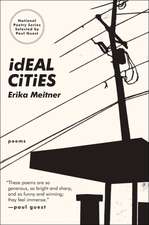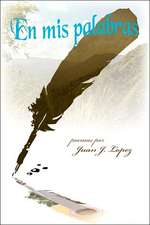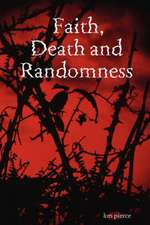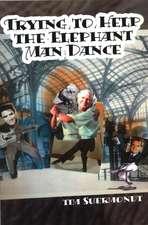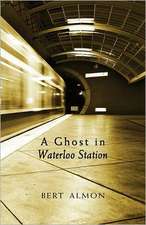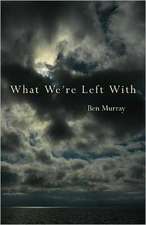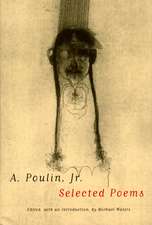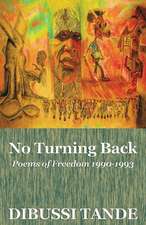Copia
Autor Erika Meitneren Limba Engleză Paperback – 8 sep 2014
Erika Meitner's fourth book grapples with the widespread implications of commercialism and over-consumption, particularly in exurban America. Documentary poems originally commissioned by Virginia Quarterly Review examine the now-bankrupt city of Detroit, once the thriving heart of the American Dream. Meitner probes the hulking ruins of office buildings, tract housing, superstores, construction sites, and freeways--exposing a vacuous world of decay and abandonment--while holding out hope for re-birth from ashes.
Because it is an uninhabited place, because it
makes me hollow, I pried open the pages of
Detroit: the houses blanked out, factories
absorbed back into ghetto palms and scrub-
oak, piles of tires, heaps of cement block.
Vines knock and enter through shattered
drop-ceilings, glassless windows. Ragwort
cracks the street's asphalt to unsolvable
puzzles.
Erika Meitner was a 2009 National Poetry Series winner. Her work has appeared in American Poetry Review, Ploughshares, Tin House, The Best American Poetry 2011, Kenyon Review, and elsewhere. She is associate professor of English at Virginia Tech.
Because it is an uninhabited place, because it
makes me hollow, I pried open the pages of
Detroit: the houses blanked out, factories
absorbed back into ghetto palms and scrub-
oak, piles of tires, heaps of cement block.
Vines knock and enter through shattered
drop-ceilings, glassless windows. Ragwort
cracks the street's asphalt to unsolvable
puzzles.
Erika Meitner was a 2009 National Poetry Series winner. Her work has appeared in American Poetry Review, Ploughshares, Tin House, The Best American Poetry 2011, Kenyon Review, and elsewhere. She is associate professor of English at Virginia Tech.
Preț: 89.91 lei
Nou
Puncte Express: 135
Preț estimativ în valută:
17.20€ • 18.01$ • 14.32£
17.20€ • 18.01$ • 14.32£
Carte disponibilă
Livrare economică 10-24 martie
Preluare comenzi: 021 569.72.76
Specificații
ISBN-13: 9781938160462
ISBN-10: 1938160460
Pagini: 104
Dimensiuni: 175 x 226 x 10 mm
Greutate: 0.2 kg
Ediția:New.
Editura: BOA Editions
ISBN-10: 1938160460
Pagini: 104
Dimensiuni: 175 x 226 x 10 mm
Greutate: 0.2 kg
Ediția:New.
Editura: BOA Editions
Recenzii
Publishers Weekly, PW Picks: Book of the Week
"Meitner, National Poetry Series Winner for Ideal Cities, delivers a collection that bursts with American abundance while simultaneously describing its decline. The collection centers around poems Meitner wrote after a commissioned trip to Detroit for Virginia Quarterly Review; inspired by urban exploration and what John Patrick Leary defined as 'ruin porn' in his article 'Detroitism.' But Meitner has a stake in personal exploration that brings intimacy and despair to these poems, which makes them more significant than the simple observations of an outsider ogling or exoticizing poverty and decay." —Publishers Weekly Starred Review
"When is it plenty? When is it enough? In Copia, Meitner gathers material from disparate places—big box stores, her grandmother, Yiddish speakers, her life in Blacksburg, VA, travel to Detroit—to consider these questions. The parts that she gathers, the fragments of language, the physical pieces of life, the things left behind, lost, abandoned are greater as a collection than any object individually. Things are more whole together, contained, bound. Meitner assembles plenitude only to ask, is plenty enough? That is the richness, the abundance of Copia." —The Rumpus
"In Erika Meitner’s Copia, the abundance of language referred to in the title springs from the American landscape. From the suburbs to the decaying city of Detroit, Meitner uncovers richness of meaning in plain American language. Common objects and signage become mediums for recovering history and personal memory." —Rain Taxi
“Copia is a collection that, like all good poetry, rewards repeated engagement. Meitner’s poems sometimes masquerade as simple reflections on the everyday, but between their lines hide startling associations and disconcerting realizations. This is what poetry should do: make us stop and take notice of everything happening—not just everywhere in our world and lives, but everywhere just beneath the surface of it all.” —Patheos
“Erika Meitner is a poet who is unafraid to probe the hulking ruins of office buildings, tract housing, superstores, construction sites, and freeways, and doesn’t shy from the interactions that occur in the Wal-Mart parking lot. Copia—her fourth collection—also includes a section of documentary poems written about Detroit that were originally commissioned for Virginia Quarterly Review. If you’re interested in poetry that is fearless in its approach to the real world with all its beauty and warts equally on display, Meitner is your poet, and Copia is your book.” —BUSTLE
The Culture Trip named Erika Meitner as one of “10 Young American Poets Changing the Face of Poetry.”
"There is a driving rhythm in this poem — the industry of crickets, the forward motion of the lines — even as there is no man-made machinery at work in the defunct auto plant. The contrast between the two heightens the tension between what is lost and the image, in the last line, of a possible future.” —New York Times Magazine
"Meitner, National Poetry Series Winner for Ideal Cities, delivers a collection that bursts with American abundance while simultaneously describing its decline. The collection centers around poems Meitner wrote after a commissioned trip to Detroit for Virginia Quarterly Review; inspired by urban exploration and what John Patrick Leary defined as 'ruin porn' in his article 'Detroitism.' But Meitner has a stake in personal exploration that brings intimacy and despair to these poems, which makes them more significant than the simple observations of an outsider ogling or exoticizing poverty and decay." —Publishers Weekly Starred Review
"When is it plenty? When is it enough? In Copia, Meitner gathers material from disparate places—big box stores, her grandmother, Yiddish speakers, her life in Blacksburg, VA, travel to Detroit—to consider these questions. The parts that she gathers, the fragments of language, the physical pieces of life, the things left behind, lost, abandoned are greater as a collection than any object individually. Things are more whole together, contained, bound. Meitner assembles plenitude only to ask, is plenty enough? That is the richness, the abundance of Copia." —The Rumpus
"In Erika Meitner’s Copia, the abundance of language referred to in the title springs from the American landscape. From the suburbs to the decaying city of Detroit, Meitner uncovers richness of meaning in plain American language. Common objects and signage become mediums for recovering history and personal memory." —Rain Taxi
“Copia is a collection that, like all good poetry, rewards repeated engagement. Meitner’s poems sometimes masquerade as simple reflections on the everyday, but between their lines hide startling associations and disconcerting realizations. This is what poetry should do: make us stop and take notice of everything happening—not just everywhere in our world and lives, but everywhere just beneath the surface of it all.” —Patheos
“Erika Meitner is a poet who is unafraid to probe the hulking ruins of office buildings, tract housing, superstores, construction sites, and freeways, and doesn’t shy from the interactions that occur in the Wal-Mart parking lot. Copia—her fourth collection—also includes a section of documentary poems written about Detroit that were originally commissioned for Virginia Quarterly Review. If you’re interested in poetry that is fearless in its approach to the real world with all its beauty and warts equally on display, Meitner is your poet, and Copia is your book.” —BUSTLE
The Culture Trip named Erika Meitner as one of “10 Young American Poets Changing the Face of Poetry.”
"There is a driving rhythm in this poem — the industry of crickets, the forward motion of the lines — even as there is no man-made machinery at work in the defunct auto plant. The contrast between the two heightens the tension between what is lost and the image, in the last line, of a possible future.” —New York Times Magazine
Notă biografică
Erika Meitner’s first collection of poems, Inventory at the All-night Drugstore, won the 2002 Anhinga-Robert Dana Prize for Poetry from Anhinga Press. Her second collection, Ideal Cities, was a winner of the 2009 National Poetry Series and was published by Harper Collins in 2010. Her next book, Makeshift Instructions for Vigilant Girls, was published by Anhinga Press in 2011. She is a graduate of Dartmouth College and the MFA program at the University of Virginia, where she was a Henry Hoyns Fellow, and also earned an M.A. in Religion as a Morgenstern Fellow in Jewish Studies. Her work has appeared in American Poetry Review, The Best American Poetry 2011, Gulf Coast, Ploughshares, Best African American Essays 2010, Tin House, and Prairie Schooner, among other journals and anthologies. She is currently an associate professor of English at Virginia Tech, where she teaches in the MFA program.
Cuprins
TABLE OF CONTENTS
I.
2 Litany of Our Radical Engagement with the Material World
4 Niagara [White towels...]
5 Big Box Encounter
6 Correspondence
8 with/out
9 Staking a Claim
11 Interrobang
13 Niagara [Witness this:]
14 Past-Future/Future-Past
15 Terra Nullius [When we were done...]
16 Apologetics
18 Retail Space Available
II.
20 Maple Ridge [It rains and rains...]
22 untitled [and the moon]
23 Yizker Bukh
25 And the moon
26 Yiddishland
27 Inconsequential Alchemy
28 Snowpocalypse
29 To Whom it May Concern:
31 One Version of December
32 Wal-Mart Supercenter
34 You Return the Torah to the Ark
35 The Architecture of Memory
37 Let the future begin this way:
40 Maple Ridge [It is nearly Halloween...]
III.
42 The Book of Dissolution
43 Post-Industrialization
44 By Other Means
45 Ghostbox
46 In/exhaustible
48 All that Blue Fire
50 Outside the Abandoned Packard Plant
51 And After the Ark
52 The Language of Happiness
54 Inside the Frame
55 Outside the Frame
56 Borderama
58 Terra Nullius [The poem in which...]
60 Cosmogony/Progeny
62 Ars Poetics with Radio Apparatus, Toddler, & Ducks
64 Porto, Portare, Portavi, Portatus
I.
2 Litany of Our Radical Engagement with the Material World
4 Niagara [White towels...]
5 Big Box Encounter
6 Correspondence
8 with/out
9 Staking a Claim
11 Interrobang
13 Niagara [Witness this:]
14 Past-Future/Future-Past
15 Terra Nullius [When we were done...]
16 Apologetics
18 Retail Space Available
II.
20 Maple Ridge [It rains and rains...]
22 untitled [and the moon]
23 Yizker Bukh
25 And the moon
26 Yiddishland
27 Inconsequential Alchemy
28 Snowpocalypse
29 To Whom it May Concern:
31 One Version of December
32 Wal-Mart Supercenter
34 You Return the Torah to the Ark
35 The Architecture of Memory
37 Let the future begin this way:
40 Maple Ridge [It is nearly Halloween...]
III.
42 The Book of Dissolution
43 Post-Industrialization
44 By Other Means
45 Ghostbox
46 In/exhaustible
48 All that Blue Fire
50 Outside the Abandoned Packard Plant
51 And After the Ark
52 The Language of Happiness
54 Inside the Frame
55 Outside the Frame
56 Borderama
58 Terra Nullius [The poem in which...]
60 Cosmogony/Progeny
62 Ars Poetics with Radio Apparatus, Toddler, & Ducks
64 Porto, Portare, Portavi, Portatus
Descriere
Started as a VQR documentary, Copia examines the now-bankrupt city of Detroit, once the thriving heart of the American Dream.

